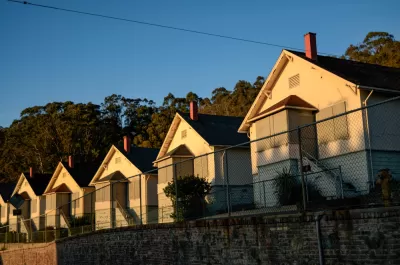As community land trusts take root and expand, they face numerous questions on how to stay communally-focused while their geographic scope grows.

"Community control" has as many meanings as "scale"—and as many meanings as "community." The baseline under it all is that properties have been permanently removed from the speculative market with their use to be determined for the good of a community, rather than for profit.
But that simple definition would also encompass publicly owned land and all nonprofit-owned land (not subject to Low Income Housing Tax Credit investor control). Typically, the intention of a CLT is for community control to go deeper than changing the name on the deed, aiming for something more like democratic control within their organization.
A classic CLT is a membership organization with members drawn from its service area. One-third of the board are CLT residents, elected by other CLT residents; one-third are community residents, elected by the members; with the remaining one-third being public representatives of other stakeholders, whether elected officials or professionals who support the mission. This is what makes a CLT different from a standard housing nonprofit, which may have a resident on the board, but rarely a majority, says Zach Murray, a CLT consultant who formerly worked for Grounded Solutions Network and the Oakland Community Land Trust (Oak CLT) in Oakland, California. "The democracy component is what separates the CLT from a traditional CDC, or even a housing authority," Murray says.
We’re creating space in the leadership of an organization for residents and for community members …. In housing, it’s really important that folks have a say in the communities that they live in. It’s different than just having a resident council or resident adviser group, actually having folks at the table to know the full extent of the operations of the organization.
When a CLT grows, the "community" in question can become more difficult to define. But to some extent it always was.
FULL STORY: Keeping Community Control as Community Land Trusts Grow

Maui's Vacation Rental Debate Turns Ugly
Verbal attacks, misinformation campaigns and fistfights plague a high-stakes debate to convert thousands of vacation rentals into long-term housing.

Planetizen Federal Action Tracker
A weekly monitor of how Trump’s orders and actions are impacting planners and planning in America.

In Urban Planning, AI Prompting Could be the New Design Thinking
Creativity has long been key to great urban design. What if we see AI as our new creative partner?

Pedestrian Deaths Drop, Remain Twice as High as in 2009
Fatalities declined by 4 percent in 2024, but the U.S. is still nowhere close to ‘Vision Zero.’

King County Supportive Housing Program Offers Hope for Unhoused Residents
The county is taking a ‘Housing First’ approach that prioritizes getting people into housing, then offering wraparound supportive services.

Researchers Use AI to Get Clearer Picture of US Housing
Analysts are using artificial intelligence to supercharge their research by allowing them to comb through data faster. Though these AI tools can be error prone, they save time and housing researchers are optimistic about the future.
Urban Design for Planners 1: Software Tools
This six-course series explores essential urban design concepts using open source software and equips planners with the tools they need to participate fully in the urban design process.
Planning for Universal Design
Learn the tools for implementing Universal Design in planning regulations.
planning NEXT
Appalachian Highlands Housing Partners
Mpact (founded as Rail~Volution)
City of Camden Redevelopment Agency
City of Astoria
City of Portland
City of Laramie




























